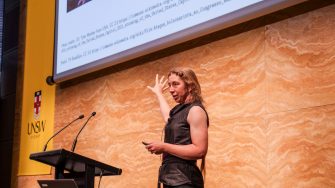CSE hosts annual John Lions Distinguished Lecture Series
The event featured talks by Professor Timothy Roscoe from ETH Zurich and Dr Vanessa Teague, founder of Democracy Developers Ltd.
The event featured talks by Professor Timothy Roscoe from ETH Zurich and Dr Vanessa Teague, founder of Democracy Developers Ltd.

In a world increasingly driven by technology, computer science plays a pivotal role in addressing the challenges faced by governments, societies, and individuals. This theme takes the centre stage in the annual John Lions Distinguished Lecture Series, held in honour of the late John Lions, a renowned figure in the field of computer science and a previous Associate Professor at the School of Computer Science and Engineering.
John was well-known for his impactful teachings and for his line-by-line commentary of the Unix V6 source code, also referred to as the ‘Lions Book’ which became the ‘The Most Famous Suppressed Manuscript in Computer History’. As a pioneer of the open-source movement, John Lions not only shaped the world of computer science, but also the lives of his students, colleagues and world leaders in the industry today.
This year’s event featured two distinguished speakers, Professor Timothy Roscoe, professor at ETH Zurich and Dr. Vanessa Teague, the founder of Democracy Developers Ltd. Their talks shed light on how computer science can inspire innovation and offer solutions to pressing real-world problems.
In the first session, Dr. Vanessa Teague tackled the critical issue of election integrity.
Elections are the cornerstone of democracy, and ensuring their security and verifiability is of paramount importance. In her talk entitled “Verifying Australian Election Outcomes – Whose Job is That?”, Dr. Teague discussed the challenges in ensuring elections are counted and finalised correctly. During questions she addressed shortcomings in various internet voting systems, some of which she helped uncover.
In the second session, Professor Timothy Roscoe from ETH Zurich addressed the concept of operating systems and their relevance in today's computing landscape. Prof. Roscoe reported on the realities of modern computer architectures, and what a small part of it is controlled by what is considered the operating system, with the majority operating under the hood and having more control than the notional OS. He issues a call-to-arms to take a broader view of the OS, and extend the use of formal methods to the "hidden" parts.
The lectures were attended by staff, students, alumni and industry professionals, as well as members of the John Lions Committee and John’s family, and was followed by a networking reception.